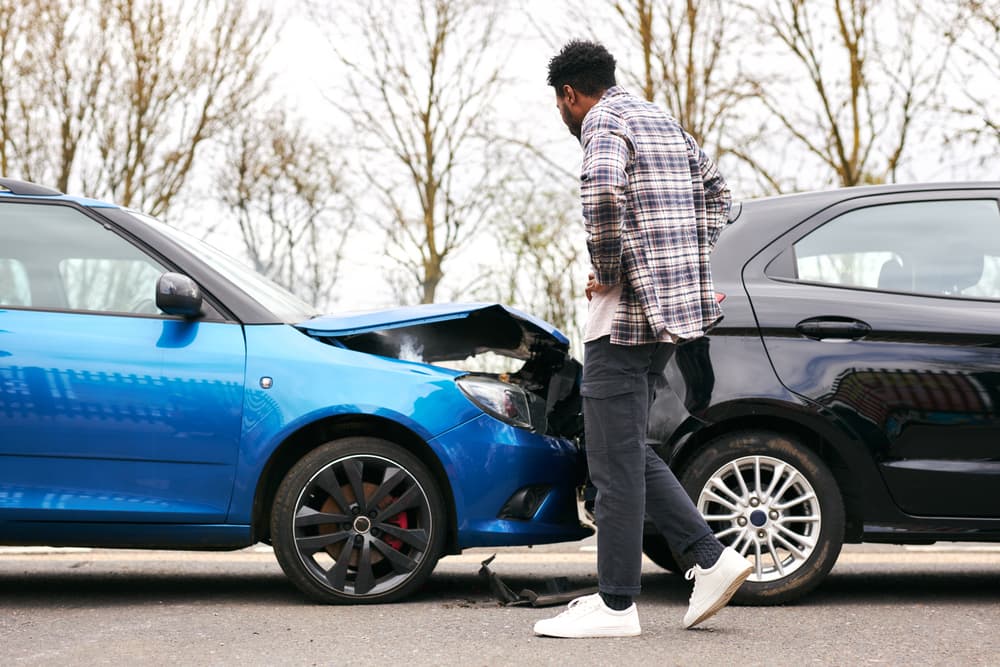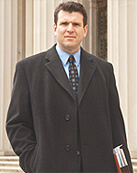A rear-end collision occurs when the front of one vehicle collides with the rear of another. Depending on how fast the vehicles were traveling when they collided and potentially other factors, rear-end collisions can cause serious injuries. If this happens to you, you have the right to pursue an injury claim. An experienced car accident attorney in Bronx can determine fault, gather evidence, and craft a strong case on your behalf.
What to Do if Someone Rear-Ends Your Vehicle
Being hit from behind while driving can often come as quite a shock when you are least expecting it. Even still, your actions in the days and weeks after the accident can significantly impact the outcome of your car accident claim. Here are some essential steps to take after being involved in a rear-end accident:
Seek Medical Attention
Seek medical attention after being rear-ended in a car accident for medical and legal reasons.
Not all injuries are immediately apparent. After an accident, your body naturally releases adrenaline, which can sometimes mask pain and injuries. This may lead you to underestimate the severity of your condition. Symptoms of some injuries, like whiplash, concussions, or internal injuries, may not manifest right away.

A medical professional can perform a thorough examination to identify and treat any hidden injuries. Prompt medical attention can prevent minor injuries from escalating into more severe or chronic conditions. For example, untreated whiplash can lead to chronic neck pain and other complications.
Some injuries, like soft tissue injuries, may not cause pain immediately after the accident. However, they can develop over the following days or weeks. Seeking prompt medical attention ensures that any such injuries are detected and start treatment early.
You need a documented medical record for any potential insurance claims or legal proceedings. It establishes a clear link between the accident and your injuries. If you wait to seek medical attention or don't seek medical attention, your car accident attorney may have trouble proving the rear-end accident caused your injuries.
If you pursue a personal injury claim, having a medical record can help in accurately assessing the damages you deserve, maximizing your compensation. This includes medical bills, lost income, and pain and suffering.
Unfortunately, delaying medical treatment may allow the at-fault party's insurance company or their attorneys to argue that your injuries are not as severe as claimed or happened due to something other than the accident. In addition, some insurance policies require policyholders to seek medical attention within a certain time frame after an accident. Failing to do so can jeopardize your ability to make a claim.
Timely medical records serve as valuable evidence in a legal case. They provide a clear timeline of your injuries and treatment, which can be crucial in building a strong case.
Have a professional assess your condition, even if you feel fine initially after being rear-ended in a car accident. This promptly diagnoses and treats any injuries. Additionally, it plays a critical role in any potential legal proceedings, establishing causation, maximizing compensation, and strengthening your case.
Seek the Services of an Experienced Car Accident Attorney
Once you seek medical care and are stable, hire an experienced car accident attorney to review your claim and represent you. You need an experienced car accident attorney after a rear-end collision for several compelling reasons.
Experienced car accident attorneys know personal injury law, which includes various legal complexities related to accidents. They possess in-depth knowledge of relevant state statutes, case law, and procedural rules, allowing them to navigate the complexities of your case effectively.
An experienced attorney can conduct a thorough investigation to establish liability and hold all responsible parties accountable.
Seasoned car accident attorneys understand the damages you deserve, including medical expenses, lost income, property damage, pain and suffering, and more. They work tirelessly to recover the full and fair compensation you deserve. It establishes the extent of your injuries and their impacts on your life.
Experienced attorneys work with medical professionals and experts to thoroughly assess your injuries, project future medical needs, and calculate the actual value of your damages.
Auto insurance companies and their adjusters are notorious for employing many tactics or denying claims altogether. An experienced attorney has dealt with insurance companies before and knows how to negotiate effectively on your behalf. They can protect your rights and prevent insurance adjusters from taking advantage of you. Hire an attorney before speaking with one so they can protect your rights from the start.
Vital evidence in a car accident case can be lost or compromised over time. An experienced attorney can quickly gather and preserve crucial evidence, such as accident reports, witness statements, photographs, and medical records. This ensures a strong foundation for building your case.
You should also be aware that the legal process involves strict deadlines and procedural requirements. Missing a deadline or failing to adhere to legal protocols can have severe consequences for your case. An experienced attorney will file all paperwork correctly and on time, and follow all legal rules to give your case the best chance of success.
While many car accident cases settle out of court, a few may proceed to trial. If this happens, you need an experienced litigator. They know how to present a compelling case in court, cross-examine witnesses, and argue effectively on your behalf.
Hit from Behind Car Accident Statistics
While rear-end accidents are the most common type of accident on American roadways, they are no less severe than other types of accidents. They still cause severe injuries and even fatalities. An estimated 1.7 million rear-end collisions happen in the U.S. each year. Approximately 1,700 people die, and another 500,000 suffer an injury in these crashes.
Who is at Fault for a Rear-End Collision?
While it may appear that the rear driver is always at fault in a rear-end collision or when a vehicle hits you from behind, several potential parties can be at fault.
These parties include:
- Rear driver: In most rear-end collisions, the rear driver is at fault. Perhaps they were distracted, following too close to prevent an accident or speeding. Typically, the rear driver must maintain enough distance between them and the car in front of them to prevent an accident - even if the driver of the vehicle in front comes to a sudden, unexpected stop.
- Front driver: If the driver of the front vehicle applies their brakes suddenly or puts their car in reverse for some reason, they might be at least partly at fault for causing the accident.
- Third-party: Sometimes, neither the rear nor front driver causes these accidents. Third-party causes can involve several circumstances, such as poor weather, bad road designs, lack of road maintenance, malfunctioning traffic lights, or a mechanical defect, such as faulty brakes. Often, third-party liability isn't readily apparent, so you need an experienced car accident lawyer to thoroughly investigate your rear-end accident and determine liability.
Causes of Rear-End Collisions
Recent vehicle safety enhancements have made significant strides in accident prevention, yet rear-end collisions persist as one of the most prevalent types of car accidents in the United States. Numerous factors contribute to these incidents, ranging from human error to unforeseen circumstances. Some of the key causes include:
Distracted Driving
In an age dominated by technology, distractions behind the wheel have become a leading cause of rear-end collisions. Whether texting, talking on the phone, or even fiddling with in-car entertainment systems, diverting attention from the road significantly increases the risk of accidents.
Reaching for Objects
A seemingly harmless act, reaching for an item within the vehicle, can have dire consequences. Taking one's eyes off the road, even momentarily, can lead to a rear-end collision.
Tailgating and Insufficient Following Distance
Failing to maintain a safe distance from the vehicle in front is a recipe for disaster. When the leading vehicle makes a sudden stop, the tailgating driver often has insufficient time to react, resulting in a rear-end collision.
Adverse Weather Conditions
Inclement weather like rain, snow, or ice creates treacherous driving conditions. Reduced traction on wet or slippery roads can lead to skidding and, ultimately, a rear-end collision. However, the following driver must maintain a safe distance between their vehicle and the one in front of them. In adverse weather, this typically means leaving more space in between vehicles.
Inadequate Road Maintenance
Neglected roads with potholes, uneven surfaces, or inadequate signage can contribute to accidents. These conditions may catch drivers off guard, causing sudden stops or unexpected maneuvers.
Brake System Malfunctions
Brake failure can lead to rear-end collisions. Without functional brakes, a driver cannot bring the vehicle to a stop, increasing the risk of accidents. Drivers must maintain their vehicles with functional and reliable brakes. In addition, brake manufacturers must not produce or sell defective products that can cause accidents.
Faulty Tail Lights
Properly functioning tail lights communicate a vehicle's movements to those behind. Suppose a driver's tail lights are malfunctioning or broken. In that case, it can lead to confusion and potentially result in a rear-end collision. Again, both drivers and parts manufacturers share responsibility for properly functioning tail lights
Impaired Driving
Driving a vehicle under the influence of alcohol or drugs significantly impairs a driver's judgment and reaction time. It also increases the likelihood of a rear-end collision due to delayed responses.
Insufficient Lighting at Night
Driving at night necessitates heightened awareness and adequate stopping distance. Failing to adjust driving habits for reduced visibility can lead to accidents, especially rear-end collisions.
Medical Emergencies
Sudden medical events, such as a heart attack or fainting spell, can cause a driver to lose control, leading to an accident. In these situations, the incapacitated driver may not take evasive action. While sometimes these emergencies happen without warning, other drivers on the road know they have certain medical conditions and shouldn't be driving.
How Much Money Will I Get in a Rear-End Accident?
Rear-end accident settlement examples are difficult to come by as all accidents differ. Some rear-end collisions result in only minor cosmetic damage and little to no injuries, while others cause catastrophic injuries and nearly obliterate the rear-ended vehicle. The more severe your injuries and vehicle damage, the more money you stand to receive.
However, you should know that the value of your rear-end collision claim depends on your damages. In a personal injury claim, damages are the economic or non-economic losses, suffering, and inconveniences you have endured due to the accident.
Non-economic damages include:
- Past and future medical costs, including emergency medical attention, hospital stays, surgery, doctor's appointments, mental health care, rehabilitation, physical therapy, medical and assistive devices and equipment, prescriptions, and over-the-counter medications
- Past and future lost income
- Property damage
Economic damages don't have an objective value. They include:
- Pain and suffering
- Scarring and disfigurement
- Mental anguish
- Humiliation
- Loss of enjoyment of life
- Loss of consortium
The best way to find out the value of your rear-end collision injury claim, contact an experienced car accident attorney. After evaluating your accident and injuries, they can provide you with an estimate of the payout for your rear-end accident.

Speak with an Experienced Car Accident Attorney Today
If another driver recently hit you from behind, don't waste time getting the medical attention you need and speaking with an experienced Bronx personal injury attorney. The sooner you can take these actions, the better you protect your rights and maximize your injury compensation.



